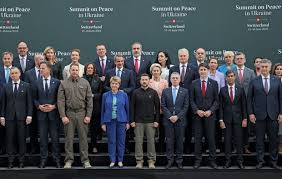India’s decision to attend but not vote at the Swiss conference was right
The two-day “Summit on Peace”, that ended on Sunday in Burgenstock, met with mixed outcomes. Switzerland was able to bring together more than 90 countries, at least 56 were represented by leaders, and the final joint communiqué was signed by about 82 countries and organisations, with the exception of a few including India. The document made a strong call for an end to the “ongoing war of the Russian Federation against Ukraine” and a pitch for sovereignty, territorial integrity and adherence to international law. It cited three areas of broad understanding: nuclear safety, food security and the exchange of all prisoners of war, displaced and detained Ukrainians. The statement was not very ambitious in its scope, as the organisers were keen to bring as many countries, particularly from the ‘Global South’ on board — which they managed to do to some extent. However, despite all these areas where Ukrainian President Zelenskyy hailed a “historic victory”, there were shortcomings. Switzerland’s decision not to invite Russia, and to build their negotiations on the basis of the Ukraine Peace Formula along with UN resolutions, made the event appear one-sided. The failure in convincing China, which arguably holds the most sway over Moscow, to even send a delegation was another blow. That no BRICS member, current and future, signed on to the statement indicates that it was a non-starter among the emerging economies.
Switzerland, Ukraine and other western countries had made a special attempt to win India’s favour for the conference, including a last minute appeal by Mr. Zelenskyy when he met PM Modi at the G-7 outreach summit in Italy. As a close partner of Russia, a key Global South player, and a country that has kept a balance in the conflict, India’s presence would have been a major win for the organisers. However, while New Delhi sent the NSA and Deputy NSA to two preparatory conferences in Jeddah and Davos, the Indian delegation here was led by the Secretary (West) in the External Affairs Ministry. India has consistently abstained from every resolution at the UN, Security Council, IAEA, Human Rights Council and other multilateral fora that seeks to criticise Russia for its invasion of Ukraine. While India may share concerns over much of the text released at the conference, it could not have gone ahead with its overtly anti-Russian slant. In its presence, however, New Delhi showed that it is willing to be part of the process, especially if it leads to a more inclusive future conference, with Russia and Ukraine at the table. As a result, India’s decision to attend the conference, but not endorse its outcome, was probably a foregone conclusion.
